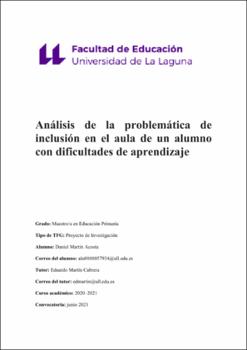Análisis de la problemática de inclusión en el aula de un alumno con dificultades de aprendizaje.
Autor
Martín Acosta, DanielFecha
2021Resumen
La educación inclusiva se puede definir como un proceso que intenta responder a la
diversidad de los estudiantes incrementando su participación en el aprendizaje y
reduciendo su exclusión del sistema educativo. Se pretende que todos los alumnos
alcancen los mismos objetivos/competencias en la medida de sus posibilidades, pero
existen una serie de factores que pueden obstaculizar el adecuado progreso académico de
los alumnos. El objetivo principal de este trabajo es analizar el contexto educativo de un
grupo de 6º de Primaria, en el que hay un alumno con necesidades específicas de apoyo
educativo, con la finalidad de ofrecer sugerencias apropiadas de intervención en el aula
que contribuyan a mejorar la situación de aprendizaje del alumno. Utilizando los
instrumentos de la observación directa y el análisis de las respuestas a una entrevista
realizada a la profesora tutora del grupo de clase, se pretende investigar los factores
principales que condicionan que el alumno pueda tener o no éxito en su progreso
académico como son la relación entre la profesora y el alumno, los recursos educativos y
humanos de los que ella dispone para poder llevar a cabo su labor docente con el alumno
de manera adecuada y el grado de implicación de la familia para facilitar el aprendizaje
del alumno. Los resultados revelan que la responsabilidad recae fundamentalmente en la
profesora y que se necesita una mayor implicación de todos los agentes del sistema
educativo, incluyendo la aportación de los recursos humanos suficientes por parte de los
organismos políticos correspondientes, para que el alumno pueda progresar
adecuadamente. Inclusive education can be defined as a process which seeks to respond to the diversity of
students by increasing their participation in the learning context and by reducing their
exclusion from the educational system. It is intended that all students achieve the same
objectives/competencies to the best of their ability, but there are a number of factors that
can hinder the adequate academic progress of students. The main purpose of this study is
to analyze the educational context of a Primary school 6th-year group, in which a student
3
with specific needs of educational support is involved, in order to offer some suggestions
for appropriate intervention in the classroom that may contribute to improving the
student’s learning situation. Using the instruments of direct observation and the analysis
of the responses to a survey implemented to the tutor-teacher of the class, I investigate
the main factors that determine whether or not the student may be successful in his
academic progress, such as the relationship between the teacher and the student, the
educational and human resources that she has to be able to carry out her teaching work
with the student in an appropriate way, and the degree of involvement of the family to
facilitate the student’s learning. The results reveal that the responsibility lies
fundamentally on the teacher and that a greater involvement of all the agents of the
educational system is needed, including the provision of sufficient human resources by
the corresponding political organizations, so that the student can progress adequately.





